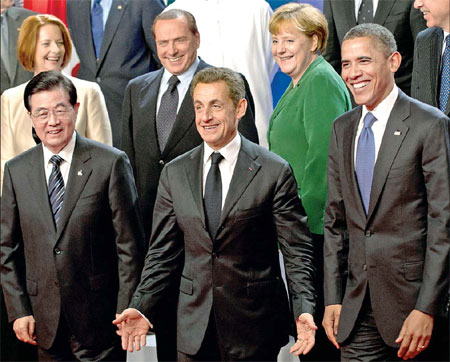IMF to get financial boost
Updated: 2011-11-05 08:20
By Zhang Haizhou and Liu Wei (China Daily)
|
|||||||||
|
President Hu Jintao joins world leaders at the G20 summit in Cannes, France, which concluded on Friday. Yves Herman / Associated Press |
Hu calls to help least-developed countries, reform world system
CANNES, France -G20 members on Friday agreed to boost the resources of the International Monetary Fund (IMF) to prevent the European debt crisis from pulling the world economy into a fresh recession - but failed to agree on how.
Speaking at the end of the two-day G20 meeting, French President Nicolas Sarkozy, the summit's host, said finance ministers of G20 members would be tasked with examining various options.
Earlier reports on Friday said G20 leaders spent a large amount of time discussing how to inject billions of dollars into the world economy through the IMF.
Sources also told Reuters that Sarkozy was pushing to include a reference to special drawing rights - a supplementary foreign exchange reserve unit maintained by the IMF - in a final G20 communique on Friday.
Reinforcing the IMF would help boost confidence, said Dirk Willem te Velde of London-based think tank Overseas Development Institute.
"I believe the IMF proposal could help stabilize the eurozone in the short term. But in the longer term, we need to reduce global imbalance by encouraging deficit countries to export more and surplus countries to increase demand."
The fiscal problem in the eurozone is just the short-term side effect of the ongoing crisis, said James S. Turley, chairman and chief executive of accounting firm Ernst & Young.
The long-term problem that European nations need to fix is a possibly significant slowdown of the economic growth.
"In the eurozone overall, there is not much of a growth story. That is as severe an issue that needs to be dealt with as the fiscal situation," Turley told China Daily in Beijing.
President Hu Jintao on Thursday called for reform of the international monetary system, including expanded use of the special drawing rights and creation of an international reserve currency with stable value, rule-based issuance and manageable supply.
US President Barack Obama hailed what he said was good progress in talks with his G20 partners on finding ways to solve the eurozone debt crisis, which has threatened the world economy.
"We came to Cannes to discuss with our European friends how they will move forward and build upon the plan they agreed to last week to resolve this crisis," he said after the G20 summit.
Tax haven fight
Apart from boosting the IMF, Sarkozy said other key achievements of the summit include warnings against tax havens.
Sarkozy said tax havens - and countries that don't share tax information - will be shunned by the international community.
"We don't want any more tax havens. Our message is clear," he said, adding G20 members have agreed to boost growth and, for the first time, had agricultural issues on the agenda.
Sarkozy's remarks were partly in response to earlier complaints the summit was "shadowed, or even hijacked, by the euro crisis issue", said te Velde.
"It would be essential for the G20's credibility that the G20 meeting in Cannes initiated long-term solutions to foster sustained growth globally rather than commenting only on quick fixes to the eurozone crisis," he said.
China has called for more help to be given to the less-developed parts of the world.
In his speech, Hu said food security, infrastructure, and tariff-free and quota-free treatment to least-developed countries have been the focus of the G20 consultations on development this year.
"To further help the least-developed countries in their endeavor to develop, China will, in the context of South-South Cooperation, give zero-tariff treatment to 97 percent of the tariff items of exports to China from the least-developed countries having diplomatic ties with China," he said.
Unlike a day earlier, the Greek issue didn't dominate Friday's discussions after it was clear that the country had called off a referendum on whether to stay in the eurozone.
Greece's Prime Minister George Papandreou may yield power to a coalition government after a confidence vote in parliament late on Friday.
Government sources told Reuters on condition of anonymity that Papandreou has struck a deal with ministers to step down and hand power to a negotiated coalition government if they help him win the vote.
One source was quoted as saying Papandreou "agreed to step down" and the situation was "very civilized, with no acrimony".
Papandreou surprisingly raised a referendum plan on Oct 31 on whether the debt-ridden nation will accept the bailout plan European leaders reached last week.
The referendum plan shocked other European leaders such as German Chancellor Angela Merkel and Sarkozy, who said Greece would not receive one cent in aid until it votes to meet its commitments to the eurozone.
Under intense pressure, Greek Finance Minister Evangelos Venizelos confirmed on Friday the referendum had been scrapped.
Cecily Liu and Li Xiang contributed to this story.
China Daily
(China Daily 11/05/2011 page1)












